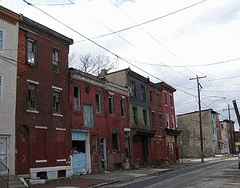| Back OpEd News | |||||||
|
Original Content at https://www.opednews.com/articles/American-Apartheid-Segreg-by-GL-Rowsey-090815-81.html (Note: You can view every article as one long page if you sign up as an Advocate Member, or higher). |
|||||||
August 18, 2009
American Apartheid: Segregation and the Making of the Underclass, by Douglas Massey and Nancy Denton (1998)*
By GL Rowsey
This book is more painful to read than Eichmann in Jerusalem, Germinal, or the pornographic The Rehnquist Choice by John Dean. But everyone should try.
::::::::
This book is more
painful to read than Eichmann in Jerusalem,
Germinal, or the pornographic The Rehnquist Choice by John Dean. But everyone should try. It describes how white Americans kept their
residential neighborhoods white, between
about 1920 to 1998. Initially, by simply murdering African-Americans
trying to move in. Then for decades, with restrictive deed covenants, enforced
in fact by white communities long after the Supreme Court declared them
unconstitutional in law. More recently,
with loan institution red-lining, and low-income public housing under-funding
and rip-offs. And most recently, with
pervasive real estate agent ruses, misdirection, and discouragement.**
Now, even more than in 1998, this history of how white neighborhoods in America have stayed white needs to be widely known and understood.
Then, the book defines "apartheid" rigorously and identifies it in sixteen urban areas in America, urban areas containing a substantial percentage of all African-Americans. Finally, the book looks at the living conditions of the most isolated, homeless and hopeless, drug-and-violence-obsessed African-Americans, and identifies apartheid as a cause, if not the cause, of these conditions.
John Dean's most popular book, The Rehnquist Choice, recounted how Nixon in the early 1970's required his three Supreme Court appointees, the most important of whom was later-Chief-Justice William Rehnquist, to be "right" on the race-residential question and, essentially, to look with disfavor on federal efforts to enforce the Fair Housing Act with respect to single-family homes. Consequently, American residential neighborhoods -- already less integrated in 1970 than in 1920 -- were less integrated in 1998 than in 1970.
Now, American residential neighborhoods are less integrated than they were in 1998.
Between 1920 and 1970 the racial prejudice of individuals probably could be blamed for American Apartheid. In the thirty-nine years since Rehnquist commenced to "put his stamp" on the United States Supreme Court, it's been the institutionalized insanity of our electoral system and its deformed progenies, based on money and gerrymandering undisturbed by Court rulings, that get the credit.
*From the Merriam-Webster online dictionary:
"Apartheid":
Function: noun
Etymology: Afrikaans, from apart apart + -heid hood
Date: 1947
1 : racial segregation; specifically : a former policy of segregation and political and economic discrimination against non-European groups in the Republic of South Africa
2 : separation, segregation apartheid> apartheid>
**From Wikipedia, on 08.15.009:
"Urban Apartheid":In the context of apartheid in South Africa, urban apartheid was a component of the apartheid system and referred to "the spatial separation of the four racial groups according to the Population Registration Act of 1950 into group areas according to the Group Areas Act of 1950."[9]
Outside of South Africa, the term "urban apartheid" has also come to refer to ghettoization of minority populations in cities within particular suburbs or neighbourhoods. The term has been used in France to describe the situation of largely impoverished Muslim immigrants being concentrated in particular suburban housing projects and being provided with an inferior standard of infrastructure and social services.[10]. The issue of Urban apartheid in France was highlighted in the aftermath of the 2005 civil unrest in France.[11].
-
(Author's note: At Wikipedia, there is no suggestion under "urban apartheid" that the condition exists in either the United States or Israel)
Authors Bio:
"How could I fail to speak with difficulty? I have new things to say."
I graduated from Stanford Law School in 1966 but have never practiced. Instead, I dropped back five years and joined The Movement, but it wasn't until the 1970's that I began writing serious prose. By 1978, I was too old to live on the streets and sweat out going to jail, so I got a serious job as a GS-4, clerk-typist with the US Forest Service. I retired 23 years later, as head of the regionwide Claims Program in the California Region, headquartered in San Francisco for 20 years and then moved to Mare Island, in Vallejo. (That early school training always catches up with us, sooner or later.)
I still live in the greater Vallejo area, and I still have radical politics. Last year my major project was contributing to the ending of the Iraq war, with a minor in ending the embargo of Cuba. This year, I'm a little confused, but what the hey, who's not?
